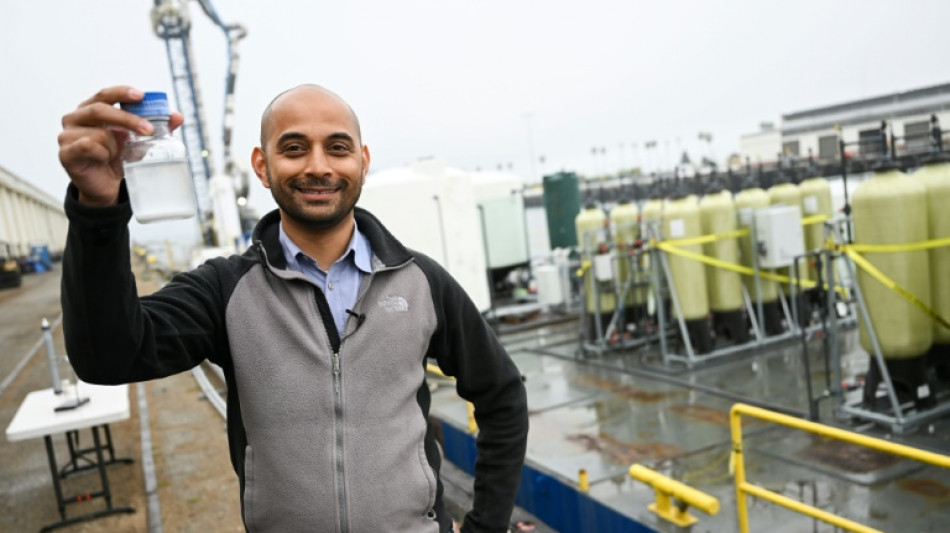
-
 Israel cancels visas for French lawmakers
Israel cancels visas for French lawmakers
-
Russia and Ukraine trade blame over Easter truce, as Trump predicts 'deal'

-
 Valverde stunner saves Real Madrid title hopes against Bilbao
Valverde stunner saves Real Madrid title hopes against Bilbao
-
Ligue 1 derby interrupted after assistant referee hit by projectile

-
 Leclerc bags Ferrari first podium of the year
Leclerc bags Ferrari first podium of the year
-
Afro-Brazilian carnival celebrates cultural kinship in Lagos

-
 Ligue 1 derby halted after assistant referee hit by projectile
Ligue 1 derby halted after assistant referee hit by projectile
-
Thunder rumble with record win over Memphis in playoff opener

-
 Leverkusen held at Pauli to put Bayern on cusp of title
Leverkusen held at Pauli to put Bayern on cusp of title
-
Israel says Gaza medics' killing a 'mistake,' to dismiss commander

-
 Piastri power rules in Saudi as Max pays the penalty
Piastri power rules in Saudi as Max pays the penalty
-
Leaders Inter level with Napoli after falling to late Orsolini stunner at Bologna

-
 David rediscovers teeth as Chevalier loses some in nervy Lille win
David rediscovers teeth as Chevalier loses some in nervy Lille win
-
Piastri wins Saudi Arabian Grand Prix, Verstappen second

-
 Kohli, Rohit star as Bengaluru and Mumbai win in IPL
Kohli, Rohit star as Bengaluru and Mumbai win in IPL
-
Guirassy helps Dortmund past Gladbach, putting top-four in sight

-
 Alexander-Arnold lauds 'special' Liverpool moments
Alexander-Arnold lauds 'special' Liverpool moments
-
Pina strikes twice as Barca rout Chelsea in Champions League semi

-
 Rohit, Suryakumar on song as Mumbai hammer Chennai in IPL
Rohit, Suryakumar on song as Mumbai hammer Chennai in IPL
-
Dortmund beat Gladbach to keep top-four hopes alive

-
 Leicester relegated from the Premier League as Liverpool close in on title
Leicester relegated from the Premier League as Liverpool close in on title
-
Alexander-Arnold fires Liverpool to brink of title, Leicester relegated

-
 Maresca leaves celebrations to players after Chelsea sink Fulham
Maresca leaves celebrations to players after Chelsea sink Fulham
-
Trump eyes gutting US diplomacy in Africa, cutting soft power: draft plan

-
 Turkey bans elective C-sections at private medical centres
Turkey bans elective C-sections at private medical centres
-
Lebanon army says 3 troops killed in munitions blast in south

-
 N.America moviegoers embrace 'Sinners' on Easter weekend
N.America moviegoers embrace 'Sinners' on Easter weekend
-
Man Utd 'lack a lot' admits Amorim after Wolves loss

-
 Arteta hopes Arsenal star Saka will be fit to face PSG
Arteta hopes Arsenal star Saka will be fit to face PSG
-
Ukrainian troops celebrate Easter as blasts punctuate Putin's truce

-
 Rune defeats Alcaraz to win Barcelona Open
Rune defeats Alcaraz to win Barcelona Open
-
Outsider Skjelmose in Amstel Gold heist ahead of Pogacar and Evenepoel

-
 Arsenal make Liverpool wait for title party, Chelsea beat Fulham
Arsenal make Liverpool wait for title party, Chelsea beat Fulham
-
Trump slams 'weak' judges as deportation row intensifies

-
 Arsenal stroll makes Liverpool wait for title as Ipswich face relegation
Arsenal stroll makes Liverpool wait for title as Ipswich face relegation
-
Sabalenka to face Ostapenko in Stuttgart final

-
 Kohli, Padikkal guide Bengaluru to revenge win over Punjab
Kohli, Padikkal guide Bengaluru to revenge win over Punjab
-
US aid cuts strain response to health crises worldwide: WHO

-
 Birthday boy Zverev roars back to form with Munich win
Birthday boy Zverev roars back to form with Munich win
-
Ostapenko eases past Alexandrova into Stuttgart final

-
 Zimbabwe on top in first Test after Bangladesh out for 191
Zimbabwe on top in first Test after Bangladesh out for 191
-
De Bruyne 'surprised' over Man City exit

-
 Frail Pope Francis takes to popemobile to greet Easter crowd
Frail Pope Francis takes to popemobile to greet Easter crowd
-
Lewandowski injury confirmed in blow to Barca quadruple bid

-
 Russia and Ukraine accuse each other of breaching Easter truce
Russia and Ukraine accuse each other of breaching Easter truce
-
Zimbabwe bowl Bangladesh out for 191 in first Test in Sylhet

-
 Ukrainians voice scepticism on Easter truce
Ukrainians voice scepticism on Easter truce
-
Pope wishes 'Happy Easter' to faithful in appearance at St Peter's Square

-
 Sri Lanka police probe photo of Buddha tooth relic
Sri Lanka police probe photo of Buddha tooth relic
-
Home hero Wu wows Shanghai crowds by charging to China Open win


'Big sponge': new CO2 tech taps oceans to tackle global warming
Floating in the port of Los Angeles, a strange-looking barge covered with pipes and tanks contains a concept that scientists hope to make waves: a new way to use the ocean as a vast carbon dioxide sponge to tackle global warming.
Scientists from University of California Los Angeles (UCLA) have been working for two years on SeaChange -- an ambitious project that could one day boost the amount of CO2, a major greenhouse gas, that can be absorbed by our seas.
Their goal is "to use the ocean as a big sponge," according to Gaurav Sant, director of the university's Institute for Carbon Management (ICM).
The oceans, covering most of the Earth, are already the planet's main carbon sinks, acting as a critical buffer in the climate crisis.
They absorb a quarter of all CO2 emissions, as well as 90 percent of the warming that has occurred in recent decades due to increasing greenhouse gases.
But they are feeling the strain. The ocean is acidifying, and rising temperatures are reducing its absorption capacity.
The UCLA team wants to increase that capacity by using an electrochemical process to remove vast quantities of CO2 already in seawater -- rather like wringing out a sponge to help recover its absorptive power.
"If you can take out the carbon dioxide that is in the oceans, you're essentially renewing their capacity to take additional carbon dioxide from the atmosphere," Sant told AFP.
- Trapped -
Engineers built a floating mini-factory on a 100-foot (30-meter) long boat which pumps in seawater and subjects it to an electrical charge.
Chemical reactions triggered by electrolysis convert CO2 dissolved in the seawater into a fine white powder containing calcium carbonate -- the compound found in chalk, limestone and oyster or mussel shells.
This powder can be discarded back into the ocean, where it remains in solid form, thereby storing CO2 "very durably... over tens of thousands of years," explained Sant.
Meanwhile, the pumped water returns to the sea, ready to absorb more carbon dioxide from the atmosphere.
Sant and his team are confident the process will not damage the marine environment, although this will require further testing to confirm.
A potential additional benefit of the technology is that it creates hydrogen as a byproduct. As the so-called "green revolution" progresses, the gas could be widely used to power clean cars, trucks and planes in the future.
Of course, the priority in curbing global warming is for humans to drastically reduce current CO2 emissions -- something we are struggling to achieve.
But in parallel, most scientists say carbon dioxide capture and storage techniques can play an important role in keeping the planet livable.
Carbon dioxide removal (CDR) could help to achieve carbon neutrality by 2050 as it offsets emissions from industries which are particularly difficult to decarbonize, such as aviation, and cement and steel production.
It could help to tackle the stocks of CO2 that have been accumulating in the atmosphere for decades.
- 'Promising solution' -
Keeping global warming under control will require the removal of between 450 billion and 1.1 trillion tons of CO2 from the atmosphere by 2100, according to the first global report dedicated to the topic, released in January.
That would require the CDR sector "to grow at a rate of about 30 percent per year over the next 30 years, much like what happened with wind and solar," said one of its authors, Gregory Nemet.
UCLA's SeaChange technology "fits into a category of a promising solution that could be large enough to be climate-relevant," said Nemet, a professor at the University of Wisconsin-Madison.
By sequestering CO2 in mineral form within the ocean, it differs markedly from existing "direct air capture" (DAC) methods, which involve pumping and storing gas underground through a highly complex and expensive process.
A start-up company, Equatic, plans to scale up the UCLA technology and prove its commercial viability, by selling carbon credits to manufacturers wanting to offset their emissions.
In addition to the Los Angeles barge, a similar boat is currently being tested in Singapore.
Sant hopes data from both sites will quickly lead to the construction of far larger plants that are capable of removing "thousands of tons of carbon" each year.
"We expect to start operating these new plants in 18 to 24 months," he said.
D.Schneider--BTB




